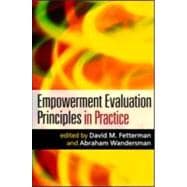
Empowerment Evaluation Principles In Practice
by Fetterman, David M.; Wandersman, AbrahamBuy New
Buy Used
Rent Textbook
Rent Digital
How Marketplace Works:
- This item is offered by an independent seller and not shipped from our warehouse
- Item details like edition and cover design may differ from our description; see seller's comments before ordering.
- Sellers much confirm and ship within two business days; otherwise, the order will be cancelled and refunded.
- Marketplace purchases cannot be returned to eCampus.com. Contact the seller directly for inquiries; if no response within two days, contact customer service.
- Additional shipping costs apply to Marketplace purchases. Review shipping costs at checkout.
Summary
Author Biography
Abraham Wandersman is Professor of Psychology at the University of South Carolina/n-/Columbia and was interim Co-Director of the Institute for Families in Society at the University of South Carolina. Dr. Wandersman performs research and program evaluation on citizen participation in community organizations and coalitions and on interagency collaboration. He is currently co-principal investigator on a participatory research study of an empowerment evaluation system, funded by the Centers for Disease Control and Prevention (CDC), and is working on a project for the program implementation and dissemination branch of the CDC center for injury prevention to facilitate a process and develop a framework on "how to bring what has been shown to work in child maltreatment prevention and youth violence prevention into more widespread practice." Dr. Wandersman is a coeditor of [i]Empowerment Evaluation: Knowledge and Tools for Self-Assessment and Accountability[/i], and has authored or edited many other books and articles. In 1998, he received the Myrdal Award for Cumulative Contributions to Evaluation Practice from the American Evaluation Association. In 2000, he was elected President of Division 27 of the American Psychological Association (Community Psychology): The Society for Community Research and Action.
Table of Contents
| A Window into the Heart and Soul of Empowerment Evaluation: Looking through the Lens of Empowerment Evaluation Principles | p. 1 |
| The Principles of Empowerment Evaluation | p. 27 |
| Empowerment Evaluation Principles in Practice: Assessing Levels of Commitment | p. 42 |
| Lessons That Influenced the Current Conceptualization of Empowerment Evaluation: Reflections from Two Evaluation Projects | p. 73 |
| Empowerment Evaluation: From the Digital Divide to Academic Distress | p. 92 |
| Organizational Functioning: Facilitating Effective Interventions and Increasing the Odds of Programming Success | p. 123 |
| Empowerment Evaluation and Organizational Learning: A Case Study of a Community Coalition Designed to Prevent Child Abuse and Neglect | p. 155 |
| Will the Real Empowerment Evaluation Please Stand Up?: A Critical Friend Perspective | p. 183 |
| Conclusion: Conceptualizing Empowerment in Terms of Sequential Time and Social Space | p. 209 |
| Author Index | p. 215 |
| Subject Index | p. 220 |
| About the Editors | p. 227 |
| Contributors | p. 229 |
| Table of Contents provided by Ingram. All Rights Reserved. |
An electronic version of this book is available through VitalSource.
This book is viewable on PC, Mac, iPhone, iPad, iPod Touch, and most smartphones.
By purchasing, you will be able to view this book online, as well as download it, for the chosen number of days.
Digital License
You are licensing a digital product for a set duration. Durations are set forth in the product description, with "Lifetime" typically meaning five (5) years of online access and permanent download to a supported device. All licenses are non-transferable.
More details can be found here.
A downloadable version of this book is available through the eCampus Reader or compatible Adobe readers.
Applications are available on iOS, Android, PC, Mac, and Windows Mobile platforms.
Please view the compatibility matrix prior to purchase.
